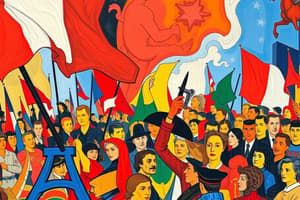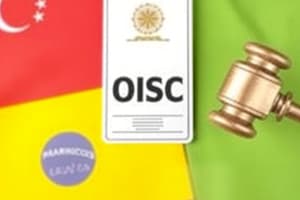Podcast
Questions and Answers
Which of the following scenarios best exemplifies the application of analytical skills within the Class 10 SST curriculum?
Which of the following scenarios best exemplifies the application of analytical skills within the Class 10 SST curriculum?
- Reciting the dates of major events in the French Revolution.
- Defining the term 'globalization' as presented in the textbook.
- Comparing the demographic impacts of the Industrial Revolution across different European nations. (correct)
- Listing the names of all the states in India and their capitals.
In the context of resource management, which approach demonstrates the highest level of strategic foresight and sustainability?
In the context of resource management, which approach demonstrates the highest level of strategic foresight and sustainability?
- Implementing policies that ensure equitable distribution of resources while considering long-term ecological consequences. (correct)
- Focusing solely on the immediate needs of the population without planning for future resource scarcity.
- Exploiting mineral resources for short-term economic gains, regardless of environmental impact.
- Adopting a laissez-faire approach, allowing market forces to dictate resource allocation.
Which policy decision exemplifies a nation's commitment to mitigating the challenges to democracy, considering social, economic, and political factors?
Which policy decision exemplifies a nation's commitment to mitigating the challenges to democracy, considering social, economic, and political factors?
- Restricting freedom of the press to maintain social order and national security.
- Implementing comprehensive land reforms to address economic inequality and empower marginalized communities. (correct)
- Decreasing public expenditure on education to reduce the fiscal deficit.
- Centralizing power within the executive branch to ensure efficient governance.
How does the study of the 'lifelines of the national economy' in geography critically influence economic policy-making in a globalized world?
How does the study of the 'lifelines of the national economy' in geography critically influence economic policy-making in a globalized world?
Which scenario exemplifies the concept of 'power-sharing' in a deeply divided society, ensuring political stability and inclusive governance?
Which scenario exemplifies the concept of 'power-sharing' in a deeply divided society, ensuring political stability and inclusive governance?
Which of the following strategies demonstrates an integrated approach to sustainable development, considering economic, social, and environmental dimensions?
Which of the following strategies demonstrates an integrated approach to sustainable development, considering economic, social, and environmental dimensions?
How might a government effectively address the challenges posed by globalization to promote equitable development and protect vulnerable populations?
How might a government effectively address the challenges posed by globalization to promote equitable development and protect vulnerable populations?
Which policy intervention best exemplifies a commitment to promoting consumer rights and ensuring fair market practices in a rapidly evolving economy?
Which policy intervention best exemplifies a commitment to promoting consumer rights and ensuring fair market practices in a rapidly evolving economy?
How does studying the Nationalist Movement in Indo-China provide insights into contemporary geopolitical dynamics and post-colonial challenges?
How does studying the Nationalist Movement in Indo-China provide insights into contemporary geopolitical dynamics and post-colonial challenges?
Considering the role of print culture in shaping the modern world, which scenario represents its most profound impact on political discourse and social change?
Considering the role of print culture in shaping the modern world, which scenario represents its most profound impact on political discourse and social change?
Which strategy most effectively combines conceptual understanding with practical application for CBSE Class 10 SST MCQ preparation?
Which strategy most effectively combines conceptual understanding with practical application for CBSE Class 10 SST MCQ preparation?
How did the French Revolution significantly contribute to the rise of nationalism in Europe, as understood within the CBSE Class 10 SST context?
How did the French Revolution significantly contribute to the rise of nationalism in Europe, as understood within the CBSE Class 10 SST context?
In what way did Mahatma Gandhi's leadership uniquely influence the Indian independence movement, as relevant to Class 10 SST?
In what way did Mahatma Gandhi's leadership uniquely influence the Indian independence movement, as relevant to Class 10 SST?
How does understanding the concept of 'resources' extend beyond mere identification to inform sustainable 'development', within the scope of Class 10 SST?
How does understanding the concept of 'resources' extend beyond mere identification to inform sustainable 'development', within the scope of Class 10 SST?
Evaluate the role of MCQs in enhancing a Class 10 student's preparedness for the SST board exam, beyond simple recall.
Evaluate the role of MCQs in enhancing a Class 10 student's preparedness for the SST board exam, beyond simple recall.
Differentiate between 'nationalism' as a unifying force and its potential manifestation as a cause for conflict, relevant to Class 10 SST.
Differentiate between 'nationalism' as a unifying force and its potential manifestation as a cause for conflict, relevant to Class 10 SST.
Assess the far-reaching implications of the Industrial Revolution beyond mere technological advancement, in the context of Class 10 Social Science.
Assess the far-reaching implications of the Industrial Revolution beyond mere technological advancement, in the context of Class 10 Social Science.
How does the principle of 'Democracy,' as taught in Class 10 SST, address historical and contemporary challenges related to representation and inclusivity?
How does the principle of 'Democracy,' as taught in Class 10 SST, address historical and contemporary challenges related to representation and inclusivity?
Analyze the strategic benefits of consistently solving previous years' question papers for Class 10 SST board exam preparation.
Analyze the strategic benefits of consistently solving previous years' question papers for Class 10 SST board exam preparation.
Evaluate the role of regular revision in mastering the Class 10 SST syllabus for effective MCQ solving and conceptual retention.
Evaluate the role of regular revision in mastering the Class 10 SST syllabus for effective MCQ solving and conceptual retention.
Flashcards
What does SST stand for?
What does SST stand for?
Stands for Social Science; a multidisciplinary subject covering History, Geography, Political Science, and Economics.
What does History study?
What does History study?
Focuses on past events, civilizations, and their impact on the present.
What does Geography study?
What does Geography study?
Deals with the Earth's features, climate, resources, and environment.
What does Political Science study?
What does Political Science study?
Signup and view all the flashcards
What does Economics study?
What does Economics study?
Signup and view all the flashcards
What is Resource and Development?
What is Resource and Development?
Signup and view all the flashcards
What is Power Sharing?
What is Power Sharing?
Signup and view all the flashcards
What is Federalism?
What is Federalism?
Signup and view all the flashcards
What are the sectors of the Indian economy?
What are the sectors of the Indian economy?
Signup and view all the flashcards
What does Consumer Rights focus on?
What does Consumer Rights focus on?
Signup and view all the flashcards
Time Management
Time Management
Signup and view all the flashcards
MCQ Practice Benefits
MCQ Practice Benefits
Signup and view all the flashcards
NCERT Textbook
NCERT Textbook
Signup and view all the flashcards
Previous Year Papers
Previous Year Papers
Signup and view all the flashcards
Nationalism
Nationalism
Signup and view all the flashcards
Resources
Resources
Signup and view all the flashcards
Democracy
Democracy
Signup and view all the flashcards
Development Goal
Development Goal
Signup and view all the flashcards
Mahatma Gandhi
Mahatma Gandhi
Signup and view all the flashcards
French Revolution
French Revolution
Signup and view all the flashcards
Study Notes
- Social Science (SST) is a multidisciplinary subject.
- SST encompasses History, Geography, Political Science, and Economics.
- SST enhances students' understanding of the world, society, and their role.
- Class 10 SST CBSE MCQs are designed to evaluate comprehension of the Class 10 Social Science curriculum.
History
- Concentrates on past occurrences, civilizations, and their impact on the present.
- Key topics include the rise of nationalism in Europe and India.
- A key area of study is the Nationalist Movement in Indo-China.
- Examines the effects of colonialism and the creation of a globalized world.
- Explores the industrialization era and its societal changes.
- Examines print culture in the modern world.
Geography
- Focuses on studying Earth's features, climate, resources, and environment.
- Resource and development is a central theme.
- Significant study areas include forest and wildlife resources, water resources, and agriculture.
- Also covers minerals, energy resources, manufacturing industries, and national economy lifelines.
Political Science
- Examines government, political systems, and civic duties.
- Important concepts include power-sharing structures and federalism.
- Key themes include democracy and diversity, gender, religion, and caste.
- Significant areas include popular struggles, movements, political parties, and democracy outcomes.
- Challenges to democracy center on issues facing democratic governments.
Economics
- Focuses on the production, distribution, and consumption of goods and services.
- Development is a central study area.
- The Indian economy’s sectors are primary, secondary, and tertiary.
- Important topics are money and credit, globalization, and its impact on the Indian economy.
- Consumer rights focuses on consumer knowledge and protection.
MCQs
- MCQs assess comprehension, application, and analytical capabilities.
- Encompass all chapters and topics in the Class 10 SST syllabus.
- Intended to evaluate understanding of key concepts, events, and figures.
- Prepare students for board exams by making them familiar with the question format.
- Evaluate recall ability and the skill to apply learned concepts in various scenarios.
- Facilitate quick assessment of student knowledge breadth and depth across the syllabus.
- Promote effective self-assessment and pinpoint areas needing improvement.
- Multiple-choice questions foster critical thinking by prompting students to choose the most suitable answer from the options provided.
- MCQ practice supports time management skills, which are critical for board exams.
- Consistent MCQ practice builds confidence by solidifying concepts and boosting accuracy.
Board Exams
- The CBSE Class 10 SST board exam assesses students' syllabus comprehension.
- MCQs are a substantial component of the question paper.
- Excellent performance in board exams is vital for future academic opportunities.
Preparation Strategies
- Thoroughly study the NCERT textbook.
- Solve past years' question papers and sample papers.
- Practice MCQs from multiple sources.
- Concentrate on understanding concepts rather than memorizing.
- Regularly revise and create notes for easy reference.
Key Concepts for MCQs
- Nationalism: Sense of pride and unity toward one's nation.
- Resources: Materials in the environment used to meet human needs.
- Democracy: A government where citizens elect representatives.
- Development: Advancement in living standards and quality of life.
Important Figures and Events
- Mahatma Gandhi: Leading figure in the Indian independence movement.
- The French Revolution: Significant event influencing the rise of nationalism in Europe.
- The Industrial Revolution: Period of major technological and economic growth.
Exam-Taking Tips
- Carefully read each question before answering.
- Rule out incorrect options to narrow the choices.
- Efficiently manage time to complete all questions.
- Review responses before submitting the paper.
Studying That Suits You
Use AI to generate personalized quizzes and flashcards to suit your learning preferences.
Description
Class 10 Social Science (SST) CBSE MCQs cover History and Geography. Key topics include nationalism in Europe and India, the impact of colonialism, resource development, and agriculture. It helps students understand the world.




